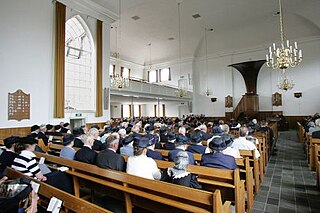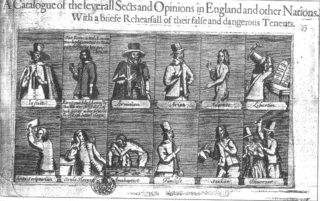Related Research Articles

Blue laws, also known as Sunday laws, Sunday trade laws and Sunday closing laws, are laws restricting or banning certain activities on specified days, usually Sundays in the western world. The laws were adopted originally for religious reasons, specifically to promote the observance of the Christian day of worship, but since then have come to serve secular purposes as well.

Sabbath in Christianity is the inclusion in Christianity of a Sabbath, a day set aside for rest and worship, a mandatory practice described in the Ten Commandments in line with God's blessing of the seventh day (Saturday) making it holy, "because on it God rested from all his work that he had done in creation". The practice was associated with the assembly of the people to worship in synagogues on the day known as Shabbat.

Sunday is the day of the week between Saturday and Monday. In most Western countries, Sunday is a day of rest and a part of the weekend. For most observant adherents of Christianity, Sunday is observed as the Lord's Day and the day of Christ's resurrection. The International Organization for Standardization’s ISO 8601 standard recognizes Sunday as the seventh day of the week,

R v Big M Drug Mart Ltd(Her Majesty The Queen in Right of Canada v Big M Drug Mart Ltd) is a landmark decision by Supreme Court of Canada where the Court struck down the federal Lord's Day Act for violating section 2 of the Canadian Charter of Rights and Freedoms. This case had many firsts in constitutional law including being the first to interpret section 2.

English Dissenters or English Separatists were Protestants who separated from the Church of England in the 17th and 18th centuries.

Sabbath desecration is the failure to observe the Biblical Sabbath and is usually considered a sin and a breach of a holy day in relation to either the Jewish Shabbat, the Sabbath in seventh-day churches, or to the Lord's Day (Sunday), which is recognized as the Christian Sabbath in first-day Sabbatarian denominations.
Section 2 of the Canadian Charter of Rights and Freedoms ("Charter") is the section of the Constitution of Canada that lists what the Charter calls "fundamental freedoms" theoretically applying to everyone in Canada, regardless of whether they are a Canadian citizen, or an individual or corporation. These freedoms can be held against actions of all levels of government and are enforceable by the courts. The fundamental freedoms are freedom of expression, freedom of religion, freedom of thought, freedom of belief, freedom of peaceful assembly and freedom of association.

Freedom of religion in Canada is a constitutionally protected right, allowing believers the freedom to assemble and worship without limitation or interference.

The Lord's Day in Christianity is generally Sunday, the principal day of communal worship. It is observed by most Christians as the weekly memorial of the resurrection of Jesus Christ, who is said in the canonical Gospels to have been witnessed alive from the dead early on the first day of the week. The phrase appears in Rev. 1:10.
Section 27 of the Canadian Charter of Rights and Freedoms is a section of the Charter that, as part of a range of provisions within the section 25 to section 31 bloc, helps determine how rights in other sections of the Charter should be interpreted and applied by the courts. It is believed that section 27 "officially recognized" a Canadian value, namely multiculturalism.

In Abrahamic religions, the Sabbath or Shabbat is a day set aside for rest and worship. According to the Book of Exodus, the Sabbath is a day of rest on the seventh day, commanded by God to be kept as a holy day of rest, as God rested from creation. The practice of observing the Sabbath (Shabbat) originates in the biblical commandment "Remember the sabbath day, to keep it holy".

The seventh-day Sabbath, observed from Friday evening to Saturday evening, is an important part of the beliefs and practices of seventh-day churches. These churches emphasize biblical references such as the ancient Hebrew practice of beginning a day at sundown, and the Genesis creation narrative wherein an "evening and morning" established a day, predating the giving of the Ten Commandments. They hold that the Old and New Testament show no variation in the doctrine of the Sabbath on the seventh day. Saturday, or the seventh day in the weekly cycle, is the only day in all of scripture designated using the term Sabbath. The seventh day of the week is recognized as Sabbath in many languages, calendars, and doctrines, including those of Catholic, Lutheran, and Orthodox churches.

The Sabbath is a weekly day of rest or time of worship given in the Bible as the seventh day. It is observed differently in Judaism and Christianity and informs a similar occasion in several other faiths. Observation and remembrance of Sabbath is one of the Ten Commandments considered to be the fourth in Judaism, Eastern Orthodoxy, and most Protestant traditions, and the third in Roman Catholic and Lutheran traditions.

Human rights in Canada have come under increasing public attention and legal protection since World War II. Prior to that time, there were few legal protections for human rights. The protections which did exist focused on specific issues, rather than taking a general approach to human rights.

Church attendance is a central religious practice for many Christians; some Christian denominations, such as the Catholic Church require church attendance on the Lord's Day (Sunday); the Westminster Confession of Faith is held by the Reformed Churches and teaches first-day Sabbatarianism, thus proclaiming the duty of public worship in keeping with the Ten Commandments. Similarly, The General Rules of the Methodist Church also requires "attending upon all the ordinances of God" including "the public worship of God". The Lutheran Christian theologian Balthasar Münter stated that church attendance is the "foundation for the Christian life" as "the Christian Bible and the sacraments provide the framework for the faith"; he also states that it is important for believers because it aids in the prevention of backsliding, as well as offers "the company of other believers". Until 1791, the government of the United Kingdom required attendance at church services of the Church of England at least twice a year.

Sabbatarianism advocates the observation of the Sabbath in Christianity, in keeping with the Ten Commandments.

Puritan Sabbatarianism or Reformed Sabbatarianism, often just Sabbatarianism, is observance of Sabbath in Christianity that is typically characterised by devotion of the entire day to worship, and consequently the avoidance of recreational activities.

Freedom of religion in Canada is a constitutionally protected right, allowing residents the freedom to assemble and worship as each sees fit without coercion, limitation or interference. The Seventh Day Adventist Church's minority status increased its sensitivity to religious freedom early in its history. Shortly after its birth in 1860, the American Civil War and later "Sunday legislation" in the 1880s and 1890s raised concerns about religious liberty. That sensitivity accompanied the church's expansion into Canada.
Law and religion is the interdisciplinary study of relationships between law, especially public law, and religion. Over a dozen scholarly organizations and committees focussing on law and religion were in place by 1983, and a scholarly quarterly, the Journal of Law and Religion, was first published that year. The Ecclesiastical Law Journal began publication in 1987. The Rutgers Journal of Law and Religion was founded in 1999. The Oxford Journal of Law and Religion was founded in England in 2012.
The Lord's Day Alliance is an ecumenical Christian first-day Sabbatarian organization. Based in the United States and Canada, the organization was founded in 1888 by mainstream Christian denominations. These Churches worked together to found the Lord's Day Alliance in order to effect change in the public sphere, specially with respect to "lobbying for the passage of Sunday-rest laws." The Lord's Day Alliance publishes a biannual magazine called eSunday Magazine.
References
- 1 2 J. R. Miller (1996). Shingwauk's Vision: A History of Canadian Residential Schools. University of Toronto Press
- ↑ Walter et al. v. Attorney General of Alberta et al. , [1969] S.C.R. 383.
- 1 2 3 United Kingdom Legislation: Statute Law (Repeals) Act 1969
- ↑ The battle for the sabbath: the sabbatarian lobby in Canada, 1890-1912 Archived 2012-03-16 at the Wayback Machine by Sharon Patricia Mean (1979), a doctoral thesis, UBC, p.83
- ↑ Gordon v. R., [1961] S.C.R. 592, June 26, 1961 Archived July 6, 2011, at archive.today
- ↑ Gordon v. R., [1961] S.C.R. 592, June 26, 1961 Archived July 6, 2011, at archive.today
- ↑ Supreme Court of Canada: R v Big M Drug Mart Ltd., (1985) 1 S.C.R. 295 Archived 2010-09-02 at the Wayback Machine
- ↑ Browne, p. 16.
- ↑ Between the modern towns of Fermeuse and Aquaforte.
- ↑ Fiske, p. 256.
- ↑ Pope, p. 32.
- ↑ Government of Canada, National Battlefields Commission, Battles of 1759 and 1760. Treaty of Paris
- ↑ "Treaty of Paris 1763." Yale Law School. Lillian Goldman Law Library. The Avalon Project.
- ↑ Freedom of Worship Act, S.P.C. 1851,14-15 Vict., c. 175.
- ↑ Saumur v. City of Quebec, [1953] 2 SCR 299, at 327.
- ↑ "CanLII - 1985 CanLII 69 (S.C.C.)". Canadian Legal Information Institute (CanLII.org). 2009-09-03. Archived from the original on 2011-05-09. Retrieved 2009-09-24.
- 1 2 La Verdure, P. (1996). Sunday in Quebec,1907-1937. CCHA, Historical Studies, 62 (1996), 47-61.
- 1 2 "The battle for the sabbath: the sabbatarian lobby in Canada, 1890-1912 by Sharon Patricia Mean (1979), a doctoral thesis, UBC, p.51" (PDF). Archived from the original (PDF) on 2012-03-16. Retrieved 2011-02-19.
- ↑ Revelation 13:11-17, New King James Version
- ↑ Shaw, Amy J. (2009). Crisis of conscience: conscientious objection in Canada during the First World War. Vancouver, University of British Columbia Press